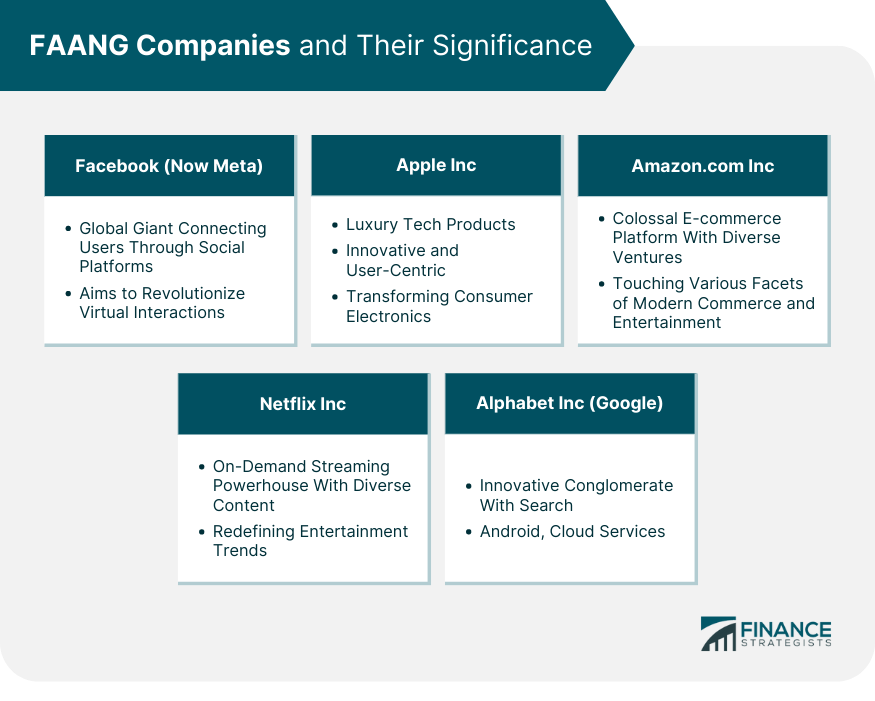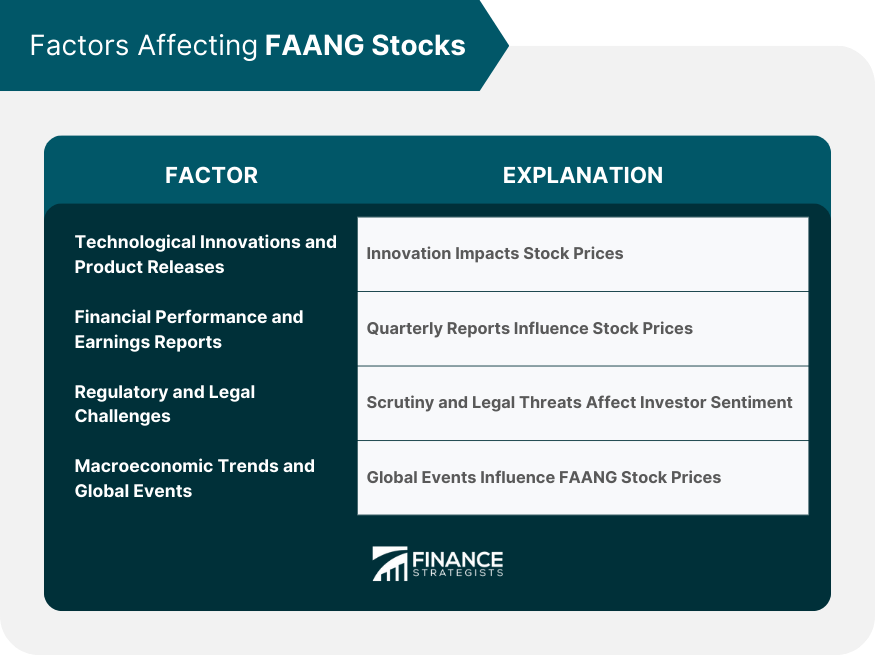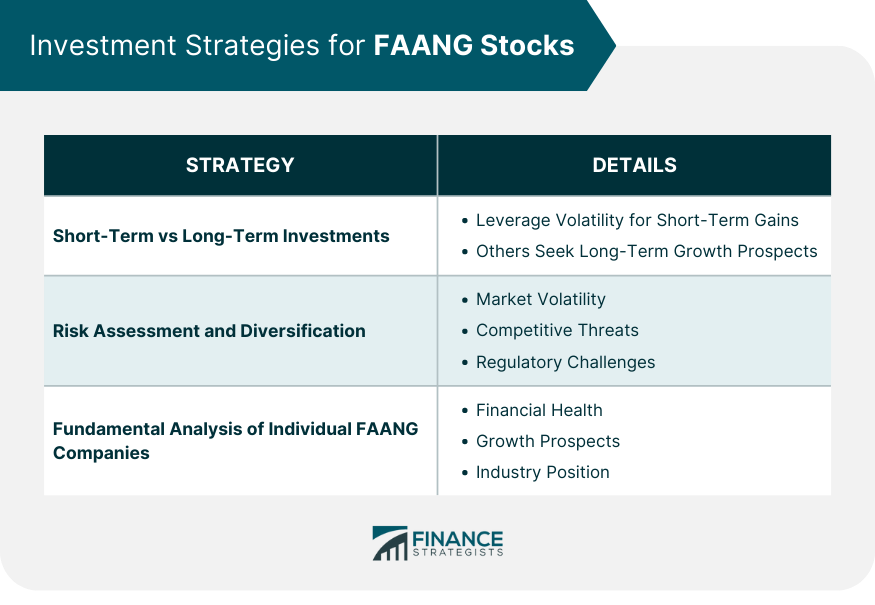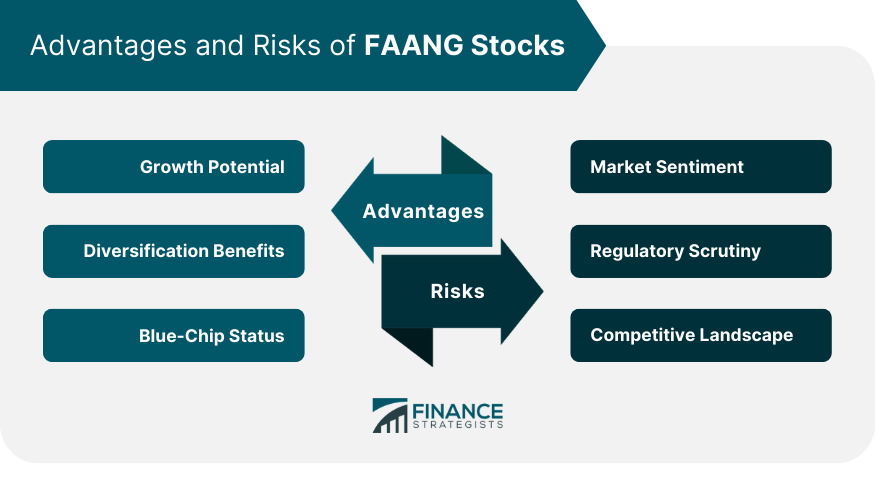"FAANG," is an acronym that refers to a few of the United States' most prominent tech companies—Facebook, Amazon, Apple, Netflix and Google. For some time now, FAANG stocks continued growth have captured the attention of stock analysts everywhere. In the last year alone, each of the 5 FAANG companies reported revenue earnings in the multi-billions, and in the last 5 years each company has seen their stock rise by at least 100%. With their staggering growth and dominance, they've also become the darlings of stock markets, representing a colossal chunk of the S&P 500's market capitalization. The five companies that are encompassed within FAANG are the who's who of tech companies. Perhaps most telling of their stature, is the market value they share and the market capitalization they've collectively accumulated. All combined, the FAANGs have accumulated 9.88 trillion dollars worth of market accumulation as of December, 2024. Making FAANG members one of the most popular stocks on the market. Furthermore, since each of the FAANG stocks are traded on the NASDAQ and are included in the S&P 500, and because the S&P is a broad representation of the market, the movement of the market mirrors the index's movement. Explore Investment Options with a Vetted Financial Advisor. Click here. Together the FAANGs make up more than 15% of the S&P - a staggering figure since the S&P is generally used as an indicator of the status of the United States economy. So it's not a stretch to say that FAANG doing well means the US is doing likewise. From a humble college project to a global giant, Facebook, rebranded as Meta, has weaved its web across continents. Offering platforms that drive social connections like Instagram, WhatsApp, and the core Facebook app, Meta is more than just a social media company. Its vision of a 'metaverse' - a collective virtual shared space, takes digitization a leap further, aiming to revolutionize how humans interact in the virtual realm. With its expansive user base and continuous drive for innovation, Meta stands tall, casting a long shadow on the tech landscape. The allure of a half-eaten apple, symbolizing the brand Apple, encapsulates its trajectory - one that's always pushing boundaries. Apple, as a company, is synonymous with luxury, innovation, and a user-centric approach. Its line of products, from iPhones to MacBooks and the proprietary software ecosystem, has transformed consumer electronics. Rooted in a culture of innovation and a penchant for design, Apple doesn't just sell products. It sells experiences, making it a formidable force in the tech and consumer electronics sector. What began as an online bookstore from a garage blossomed into the world's most colossal e-commerce platform - Amazon. But Amazon's ambitions didn't halt at e-commerce. It ventured into cloud services with AWS, entertainment with Amazon Prime, and even brick-and-mortar retail with Amazon Go. As a beacon of e-commerce innovation, Amazon's reach is unparalleled. It's not just an online marketplace but an ecosystem that touches various facets of modern commerce and entertainment. Couch, popcorn, and Netflix - a modern mantra for relaxation. Netflix, the streaming behemoth, redefined entertainment, shifting it from traditional mediums to on-demand streaming. With a vast array of content spanning genres, languages, and formats, Netflix has become the go-to for diverse entertainment tastes. Its original content, from series to documentaries, sets trends, sparks debates, and represents a new wave in the entertainment industry. "Google it!" - a phrase that testifies to the behemoth's influence. Alphabet, Google's parent company, spans multiple ventures, but its core, the search engine, remains its most iconic. From search to software in Android, cloud services, and pioneering tech initiatives like Waymo, Alphabet is a conglomerate of innovations. Its offerings, embedded in daily routines, from emails to maps, make it a cornerstone of the digital age. In the ever-evolving tech realm, innovation is the lifeblood, and FAANG companies thrive on it. These firms consistently roll out technological advancements, setting industry standards. For instance, Apple's product launches often send ripples across the market, impacting its stock prices. Similarly, when Amazon unveils a new service, investors sit up and take notice. Such innovations and product releases can spur investor enthusiasm, driving stock prices up or inciting caution if the launch misses expectations. Quarterly earnings reports are pivotal moments for FAANG companies. These reports provide a glimpse into a company's health, indicating its profitability, revenue streams, and future guidance. A positive earnings report can bolster stock prices, while any sign of financial distress can lead to dips. Given the immense market capitalization of FAANG stocks, even slight financial perturbations can have significant ramifications on broader market indices. Being giants in the tech arena, FAANG companies often find themselves under the regulatory microscope. Legal challenges, antitrust investigations, and data privacy concerns can pose substantial threats. Any regulatory action or even the hint of impending legal challenges can sway investor sentiment, impacting stock prices. Navigating this intricate web of regulations while maintaining growth is a balancing act these firms continually perform. Global events, from geopolitical tensions to economic upheavals, can influence FAANG stocks. As global entities, these firms aren't insulated from worldwide occurrences. A trade war might impact supply chains, while economic downturns could affect consumer spending. Investors, ever watchful, adjust their strategies based on these macroeconomic indicators, leading to shifts in FAANG stock prices. FAANG stocks, with their dynamic nature, offer opportunities for both short-term traders and long-term investors. While some might leverage volatility, capitalizing on short-term price movements, others see FAANG companies as long-term growth prospects. The approach varies based on risk appetite, investment goals, and market perception. However, the underpinning remains - understanding the companies, their trajectories, and the broader market landscape. While FAANG stocks offer lucrative opportunities, they aren't devoid of risks. Astute investors often employ diversification, spreading their investments across these companies to mitigate risks. This strategy ensures that even if one stock underperforms, the others might cushion the blow. Alongside diversification, periodic risk assessments, gauging factors like market volatility, competitive threats, and regulatory challenges, shape investment decisions. Not all FAANG stocks are identical. Each company operates in distinct domains, faces unique challenges, and has individual growth trajectories. Hence, fundamental analysis, delving into each company's financial health, growth prospects, and industry position, is crucial. By understanding balance sheets, earnings reports, and industry trends, investors can make informed decisions, selecting which FAANG stock aligns with their investment goals. FAANG stocks, representing tech frontrunners, embody growth. Their innovative ethos, global reach, and dominance in respective domains offer immense growth potential. As they venture into newer territories, from AI to virtual realities, their growth trajectories seem upward, making them attractive to growth-centric investors. From e-commerce to streaming, search engines to hardware, investing in FAANG offers a diversification within the tech realm. This inherent diversity can shield portfolios from industry-specific downturns. Reputation matters. FAANG stocks, with their consistent performance, market leadership, and innovation-driven ethos, have earned the coveted blue-chip status. As blue-chip stocks, they're perceived as stable, reliable, and less volatile than their lesser-known counterparts, attracting a broad spectrum of investors. FAANG stocks, given their visibility and impact, are highly susceptible to market sentiment. Positive news can lead to euphoria, driving prices up, while any negative hint can induce sharp declines. This sentiment-driven volatility necessitates a vigilant investment approach, gauging market mood swings. FAANG companies, given their market dominance, often find themselves at regulatory crosshairs. Be it antitrust concerns, data privacy issues, or competitive practices, regulatory actions can pose significant threats, leading to potential stock price disruptions. Today's leaders might face threats from tomorrow's innovators. FAANG companies, while dominant, operate in competitive landscapes. Disruptive technologies, innovative startups, or strategic shifts by competitors can pose challenges, influencing stock performance. Unfortunately, the seemingly unstoppable ascension of FAANG stocks may have to come to an end. For a short while at least. With a possible recession looming as a result of Covid-19, experts expect FAANG stocks to take a hit. Which might just mean, for the crafty investor that this is the perfect time to invest. As FAANG stock prices will likely never be lower, and almost assured to rebound once the pandemic ends. FAANG stocks, comprising Facebook, Amazon, Apple, Netflix, and Google, hold immense significance in the financial market. Their colossal market capitalization, totaling 9.88 trillion dollars showcases their dominance and influence. Representing more than 15% of the S&P 500, these tech giants have become key indicators of the US economy's status. The allure of FAANG stocks lies in their growth potential, diversification benefits, and blue-chip status, making them attractive to investors seeking stability and growth. However, their prominence also exposes them to potential risks, such as market sentiment-driven volatility, regulatory scrutiny, and challenges from the competitive landscape. Investors must consider these factors while employing short-term or long-term investment strategies and conducting thorough fundamental analyses of each FAANG company. FAANG stocks continue to captivate analysts and remain at the forefront of the ever-evolving tech and financial landscape.FAANG Stocks Definition
What Is the Significance of FAANG?
FAANG Companies
Facebook (Now Meta)
Apple Inc.
Amazon.com Inc.
Netflix Inc.
Alphabet Inc. (Google)

Factors Affecting FAANG Stocks
Technological Innovations and Product Releases
Financial Performance and Earnings Reports
Regulatory and Legal Challenges
Macroeconomic Trends and Global Events

Investment Strategies for FAANG Stocks
Short-term vs Long-term Investments
Risk Assessment and Diversification
Fundamental Analysis of Individual FAANG Companies

Advantages of FAANG Stocks
Growth Potential
Diversification Benefits
Blue-Chip Status
Potential Risks of FAANG Stocks
Market Sentiment
Regulatory Scrutiny
Competitive Landscape

Future of FAANG
Conclusion
FAANG Stocks FAQs
“FAANG”, is an acronym that refers to a few of the United States’ most prominent tech companies—Facebook, Amazon, Apple, Netflix and, Google.
All combined, the FAANGs have accumulated 9.88 trillion dollars worth of market accumulation as of December, 2024.
Together, the FAANGs make up more than 15% of the S&P – a staggering figure since the S&P is generally used as an indicator of the status of the United States economy.
Since each of the FAANG stocks are traded on the NASDAQ and are included in the S&P 500, and because the S&P is a broad representation of the market, the movement of the market mirrors the index’s movement.
With a possible recession looming as a result of Covid-19, experts expect FAANG stocks to take a hit. Which might just mean, for the crafty investor, that this is the perfect time to buy. FAANG stock prices will likely never be lower and almost assured to rebound once the pandemic ends.
True Tamplin is a published author, public speaker, CEO of UpDigital, and founder of Finance Strategists.
True is a Certified Educator in Personal Finance (CEPF®), author of The Handy Financial Ratios Guide, a member of the Society for Advancing Business Editing and Writing, contributes to his financial education site, Finance Strategists, and has spoken to various financial communities such as the CFA Institute, as well as university students like his Alma mater, Biola University, where he received a bachelor of science in business and data analytics.
To learn more about True, visit his personal website or view his author profiles on Amazon, Nasdaq and Forbes.











